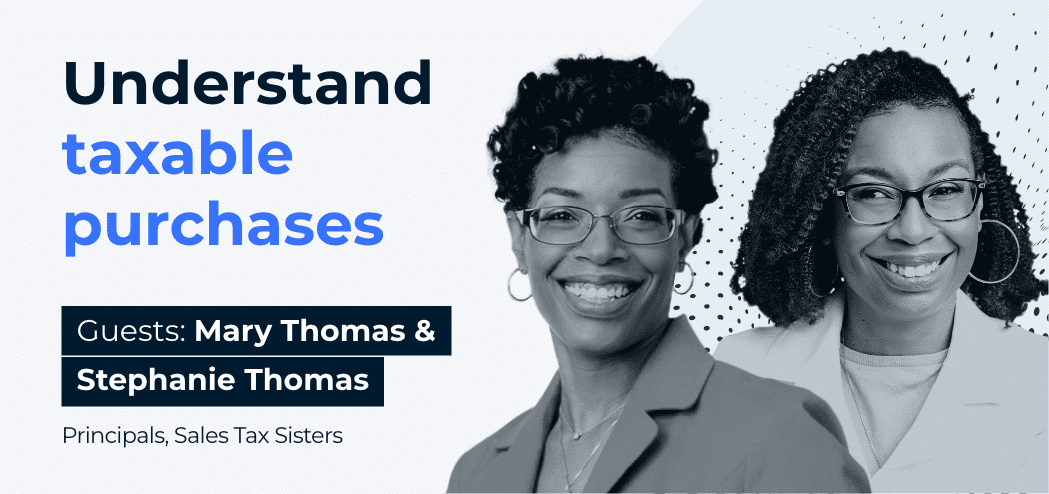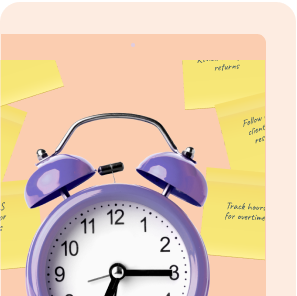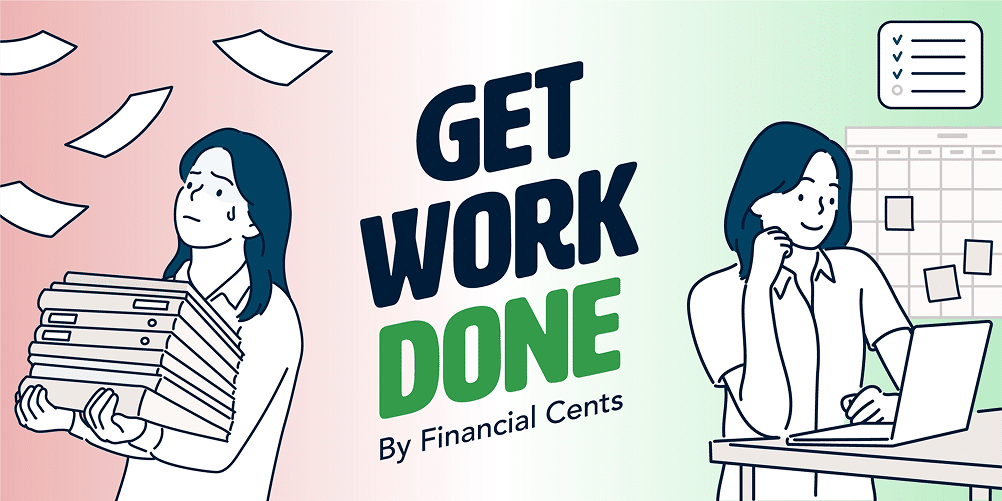Learn how Mary Thomas and Stephanie Thomas, a.k.a, The Sales Tax Sisters think about taxable purchases and why you should not only care about them but understand and recognize them for your clients’ sake.
Taxable purchases are one of those things that don’t get a lot of attention but which have a profound impact in tax planning and preparation.
While many firm owners wish they could avoid it altogether, they’ve come to realize it’s not entirely possible. But don’t worry, The Sales Tax Sisters joined us on Firm Founders Live to break down Everything Accountants Need to Know About Taxable Purchases.
In this article, you’ll find Mary and Stephanie’s thoughts on:
- What Taxable Purchases are and How They are Different from Sales Tax.
- How do You Know if Your Clients are Reporting Taxable Purchases?
- Why Accountants Should Care About Taxable Purchases.
- How Clients Face Material Cash Flow Problems Due to Taxable Purchases.
- How Taxable Purchases Work for Both Individual and Business Clients.
- What You Can Do If and When You Recognize Issues with Taxable Purchases.
Continue reading or watch the full episode below:
What Taxable Purchases are and How They are Different from Sales Tax
A sales tax is a tax paid to a governing body for the sales of certain goods and services. Usually laws allow the seller to collect funds for the tax from the consumer at the point of purchase. When a tax on goods or services is paid to a governing body directly by a consumer, it is usually called a use tax. A taxable purchase on the other hand is the purchase of a taxable product or service where the business doesn’t receive sales tax for the item/service at time of closing the sale.
Here’s an illustration:
“If I go to Office Depot which is right up the street and I buy supplies, I’m going to pay eight and a quarter percent of tax. That’s sales tax. Use tax would be if I bought the same office supplies, but my vendor instead of being Office Depot down the street, is a small vendor that has offices in California but not in Texas, where I live. And they’re not registered to collect Texas sales or use tax. We see it a lot when companies get audited where they bought something online that if they had purchased from a vendor in Texas or wherever they live, it would have been taxable. But because they bought it online from somewhere else, that entity did not charge them tax. They may have not been taxed not because tax wasn’t due, but because they weren’t permitted to collect the tax and give it to the appropriate taxing authority. And when that happens, it’s the consumer’s job to do it. And that’s why taxable purchases are important. They’re worth a lot of money in audits. Because if you have a zero balance, as relates to tax purchases – month in, month out and year in, year out – the taxing authorities know that you don’t know what you’re doing, because there should be something normally.“
– Mary Thomas
How do You Know if Your Clients are Reporting Taxable Purchases?
- In Texas, taxable purchases are reported in line number 3. If it’s always zero all the time, that’s a sign that they’re probably not recording or reporting them.
- If you handle the client’s Federal income tax returns and you see purchases of equipment and other large purchases without sales or use tax being accrued on them, that’s a red flag. The big takeaway is that if the client is ever audited, the auditor will have a taxpayer history and it will list out total sales, taxable sales, taxable purchases. If they consistently say zero all the time for taxable purchases, it immediately stands out as a red flag because every vendor is going to charge you sales tax.
- You have to not only determine whether or not sales tax was remitted and reported but also that the right amount was charged. And if there’s a discrepancy, you need to make up the difference with the tax for purchases and accruing the appropriate use tax.
More resources for you:
How To Identify Ideal Clients For Your Accounting Firm with Richard Roppa-Roberts
Why Accountants Should Care About Taxable Purchases
- Because you are your clients’ trusted advisor: Your clients see your role as their accountant as a trusted advisor that covers them and shows them the hidden things they don’t know about.
- Avoid penalties and anxieties for your clients: The Government always gets taxes one way or another, it’s never free. So in a case of unreported taxable purchases where your client receives a letter from the tax authority, you’re not only looking at the tax that has to be paid back but interests and penalties. And if your client does not have the money, it causes anxiety because now you’re talking about an additional 10-14%. Also, the statute of limitations for sales and use tax compliance is three to four years. So when you start thinking about that, it all adds up.
- For your own sanity: In addition to the client’s anxiety, you may also have anxiety.
- Keep a healthy and trusting relationship with your clients: If your client gets caught up in a situation where they have to pay huge sums in penalties, interests and additional interests, it can cause a strain in their relationship with you and introduce distrust. You have to try as much as possible to keep your finger on the pulse of what’s going on and be aware of what your client is doing.
One of the key things that I’ve always heard accountants say is that they don’t want to do sales tax. And my answer to that is you don't have to be an expert at it. You just have to know enough to say there's an issue here and work with an expert to resolve it. "
Stephanie ThomasHow Clients Face Material Cash Flow Problems Due to Taxable Purchases
A lot of business owners are ignorant about taxable purchases. They make big purchases like buying equipment, doing renovation work, or getting other fixed assets from out of state vendors or even vendors in the state who don’t charge them sales tax. And considering that it is a three to four year statute of limitation here which can add up pretty quickly to huge sums in taxable purchases, penalties, and interests.
For example, a client who does a million dollar expansion to their commercial space but the contractor didn’t charge them sales tax. Or when a client buys computer accessories for their office on say, eBay and auction houses but the vendor didn’t charge them any sales tax. Then they get that lovely letter from the taxing authority that they’re going to be audited. It will all add up.
So I always tell people, if you are engaging in a transaction that is worth a lot of money and you know that you can't handle a bill associated with an additional 10 or 14% tax, have somebody look at it. "
Mary ThomasMore resources for you:
How To Get Paid Faster And Overcome Overdue Payments (W/ Joshua Lance, Ignition)
Are Taxable Purchases Relevant to Both Individual and Business Clients?
Ideally, taxable purchases are relevant to only business clients since they are the ones that get audited. There are few instances where individuals are audited and unreported taxable purchases become a problem:
- High network individuals who make huge (and weird) purchases that catch the attention of the taxing authority.
- When a business owner uses company credit card for personal expenses.
What You Can Do If and When You Recognize Issues with Taxable Purchases
- First, determine the statute of limitations for where your client is: It usually ranges between 3-4 years, tops. Once you confirm that, go in and ask for key documents so that you can determine and start quantifying, if there is an issue, how big it is.
- Second, request for key documents: The major one being the Federal income tax return document. It’s one document auditors look at because they’re looking to see the depreciation schedule, capitalizing equipment, what fixed assets have been added, etc.
- Keep your records safe and encourage your clients to do the same: Always make sure you retain your records. Auditors want to know how you came up with the numbers that you recorded. Tell your clients to keep accurate records of their statements as well. They can take photos of their receipts and upload to the cloud, there are apps that also help keep a repository of receipts, and they can tell vendors to give them both a paper and email receipt. They need to keep the documentation of what they’re spending, because if they get audited, the only thing the auditor wants to see is a receipt that shows that sales tax was charged. You need to be able to review the expense accounts and company credit cards statement. That is very important. And something that everybody should do.
In Conclusion,
Instead of saying I don't deal with sales tax, just take a deep breath. You don't have to be an expert, you only need to have an idea of the basic framework of how it works so that if you want to call someone else to help you with it, you can do that. It's really all about making sure that the state gets paid and once you calm down and think about it in those terms, it gets a lot easier."
Mary ThomasDon't be intimidated by it (Identifying and Dealing with Taxable Purchases). Also, it's always good to know that you don't know everything. There are resources out there to help you so you can help your client and look good. "
Stephanie ThomasMary Thomas and Stephanie Thomas, The Sales Tax Sisters, run a practice area that is devoted solely to educating accountants, bookkeepers, small business owners (DIYers), and novices on basic information about sales and use tax. They are both Principals of The Sales Tax Sisters and Thomas, Thomas &; Thomas,PC.






